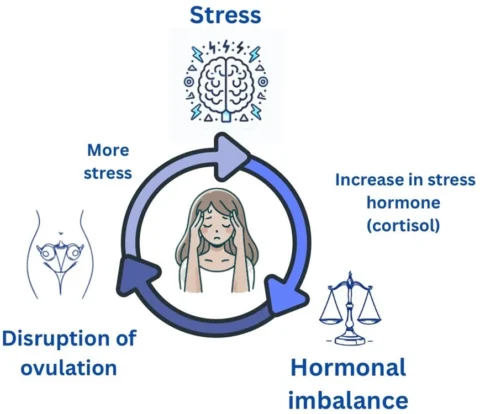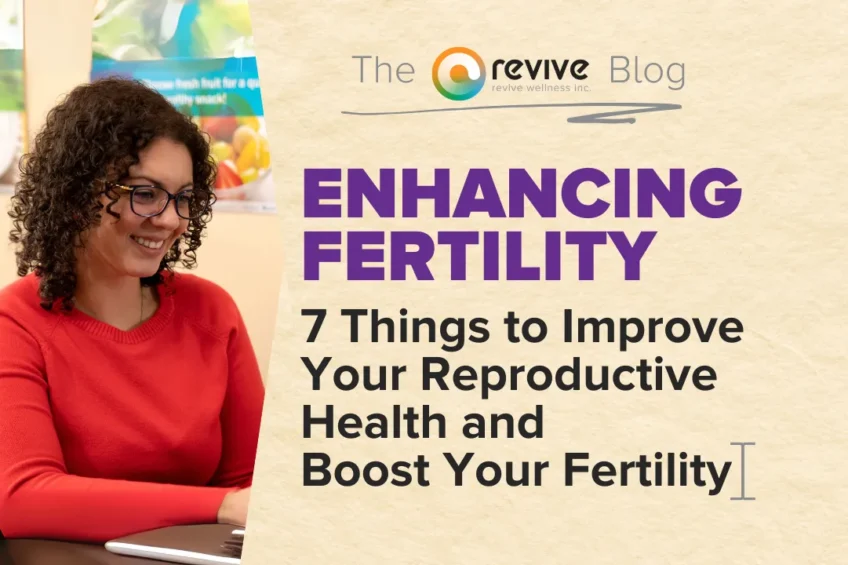7 Ways to Boost Fertility and Improve Reproductive Health
- Marina Mansour
- April 11, 2025
Embarking on the journey of conception can be challenging, particularly for the one in six Canadians facing infertility (5). Being the best version of yourself is especially important as you prepare your body to carry life. From the food you eat to the way you stay active, and even how you manage stress, these are factors that play a crucial role in your reproductive health. There’s no magic diet that will lead to pregnancy, but let’s explore seven simple things you can do today to increase your fertility.
1. Eat well-balanced, wholesome foods
Did you know that the foods you eat can either fuel inflammation or help fight it? Highly processed foods, refined sugars, trans fats, and excessive alcohol can all increase inflammation, making symptoms worse. The good news? Your diet plays a powerful role in calming inflammation and supporting overall health.
Inflammation can negatively impact fertility by:
- Disrupting hormone balance
- Impairing egg and sperm quality
- Interfering with implantation
A well-balanced diet of mainly wholesome foods, and low in processed and high sugar foods can significantly improve fertility (6). Choose more:
- ✅ Vegetables & fruits
- ✅ Whole grains (like brown rice, oats, rye, barley, quinoa)
- ✅ Lean proteins
Packed with natural antioxidants like Vitamins C and E, myo-inositol, zinc, folate, and selenium, these foods contribute to the health of both eggs and sperm. Whole grains and lean proteins help to maintain blood sugar levels and hormonal balance. Proteins also act as building blocks for a healthy pregnancy (7).
Prioritizing anti-inflammatory foods, such as fruits, vegetables, healthy fats, and lean proteins, can help support optimal fertility.
2. Avoid alcohol and drug use
Alcohol and recreational drug use can disrupt hormonal balance and increase the time it takes to get pregnant. An occasional drink here and there will likely not affect your fertility, but more excessive drinking can have negative consequences (4).
Effects of alcohol consumption:
- ⏳ Increases time to conceive
- ⚠️ Can lead to nutrient deficiencies
- 💔 Raises miscarriage risk and spontaneous abortion
- 🥚 Excessive drinking reduces egg count & quality
- ♂️ Lowers testosterone & sperm production in men
Recreational drugs, like cannabis, cocaine, and opioids, can also have a significant impact on both male and female fertility (4,10,11,12).
Effects in men:
- 🧬Cannabis, cocaine, and opioids lower testosterone & sperm production
- 🏡May alter sperm DNA & increase risk of infertility in future generations
Effects in women:
- 🩸Disrupts menstrual cycles
- 🥚Impairs egg quality & implantation
- 🚫Interferes with implantation
Try to gradually reduce the amount of alcohol and substance use at least three months before trying to conceive to allow for the production of healthy mature eggs. If you are struggling with this, seek out supports to help.
3. Quit smoking
Smoking has a significant impact on reproductive health, affecting both men and women. If you’re trying to conceive, understanding these risks can be a powerful motivator to quit (11,12).
Effects of smoking:
- ⚖️ Disrupts hormonal balance
- ⚠️ Damages reproductive organs
- 🥚 Reduces egg quality
- 🧬 Alters sperm DNA, lowering viability
- 💔 Increases risk of miscarriage & birth defects
- 🚑 Increases risk of pregnancy complications, such as ectopic pregnancy and preterm birth
Even second-hand smoke can have similar effects, potentially delaying conception by six months or more. If you’re trying to conceive, consider this a powerful reason to gradually start quitting. While it may take 3–4 months after quitting to see improvements in fertility, doing so is a crucial step toward improving pregnancy outcomes (4). Seek community supports and help from your healthcare providers to guide and support you through smoking cessation.
4. Prioritize Regular Exercise
Regular exercise plays a vital role in preparing your body for pregnancy, but balance is key (3)! A balanced approach includes a mix of moderate cardio, strength training, and restorative activities like yoga or walking, while also allowing time for rest and recovery. It’s important to listen to your body and avoid pushing yourself too hard.
Benefits of exercise:
- ✅ Improving hormonal balance
✅ Boosting metabolism
✅ Reducing stress
If you are currently exercising, it is generally safe to continue but talk to your fertility dietitian or other healthcare provider to help make sure that you are getting adequate calories to support a upcoming pregnancy. If you are not currently exercising, talk with a health professional to make sure that you are okay to do so and start slow. Keep in mind that intense exercise can put too much stress on your body and alter the hormones you need to get pregnant.
Staying active while trying to conceive will help make it easier for your body to get pregnant.
5. Effectively manage stress
Chronic stress can interfere with reproductive functions, elevating cortisol levels and disrupting ovulation. Think of it as a budget – when you are low on money, you rearrange your budget, and the things that are less important take a back seat to more important things like groceries and rent. Similarly, when you are under prolonged stress, your body prioritizes more essential functions, like keeping you safe and alive, while less critical functions like reproduction are put on hold.

While stress is a normal (and very challenging) part of the journey when trying to conceive, it can create a cycle that negatively impacts fertility (9). Stress can lead to hormonal imbalances, disrupting ovulation, which in turn can increase stress, creating a loop that’s hard to break. That’s why it’s so important to manage stress in a healthy way to help you break the cycle and support your fertility goals.
Practical stress coping strategies
- 🧘♀️ Practice yoga, meditation, and deep breathing
- 🏃♂️ Engage in regular exercise like walking, dancing, or swimming
- 📖 Try journaling to process emotions and clear your mind.
- 🎶 Listen to calming music or nature sounds to relax.
- ☀️ Spend time outdoors—fresh air and sunlight can boost your mood.
- 🤝 Connect with supportive friends, family, or a therapist.
- 🛏️ Prioritize sleep by creating a relaxing bedtime routine.
- 🎨 Engage in hobbies like painting, knitting, or gardening.
- 🍵 Sip on a warm cup of herbal tea for a soothing break.
- 💬 Seek guidance from a health professional for personalized stress management strategies.
6. Maintain a healthy weight
People come in all shapes and sizes, and weight is just one piece of the fertility puzzle. Fertility is influenced by many factors beyond weight alone, but it does play a part in hormonal balance, menstrual health, and overall reproductive function. Maintaining a weight that supports your body’s natural rhythms can help:
- ✅ Regulate ovulation by keeping estrogen and other hormones in balance.
- ✅ Improve egg & sperm quality by reducing oxidative stress and inflammation.
- ✅ Support a healthy pregnancy by lowering the risk of complications.
Over- or under-weight and female fertility (2, 8)
- ⚠️ Insulin resistance (for overweight)
- 🌸 Low estrogen
- 📅 Disruption of menstrual cycle
- 🥚 Poor egg quality
Weight and male fertility (14)
- ⬇️Low testosterone
- 🧪Reduced sperm count
- 🏊♂️Poorer sperm quality
Evidence shows that even a modest weight change of 5-10% can have a significant positive effect on fertility (15)! The key is to focus on slow, sustainable lifestyle changes rather than drastic diets or intense exercise routines.
Instead of focusing on the scale, prioritize:
- ✔️ Balanced nutrition with whole foods
- ✔️ Regular movement that feels good
- ✔️ Stress management
- ✔️Quality sleep
Weight change is challenging, and you don’t have to do it alone. If weight is a concern, please seek support from your healthcare team for personalized guidance and support.
7. Introduce prenatal supplements
While a balanced diet is the foundation of good health, prenatal supplements play a crucial role in filling any nutritional gaps to support a healthy pregnancy. 🤰✨ Even with the best diet, certain nutrients can be challenging to get in optimal amounts—this is where a high-quality prenatal vitamin comes in (1).
Key Nutrients to Look For in Prenatal Supplements:
- 🧠 Folic Acid (600 mcg+) – Helps prevent neural tube defects and supports early brain development.
- 🦴 Calcium – Essential for bone health in both mom and baby.
- 🩸 Iron – Supports oxygen transport and helps prevent anemia, which is common during pregnancy.
- 🐟 Omega-3 Fatty Acids – Supports baby’s brain and eye development, particularly DHA found in fish oil.
For those struggling with infertility, certain supplements may offer additional support. One of the most researched is CoEnzyme Q10 (CoQ10)—a powerful antioxidant that helps protect eggs and sperm from oxidative stress (13).
🔬 Research suggests CoQ10 may:
Improve egg quality and quantity, especially for women with diminished ovarian reserve.
Enhance sperm motility and concentration in men, contributing to better fertility outcomes.
Choosing the right supplements can feel overwhelming, but personalized guidance can make all the difference. Consulting with a fertility dietitian at Revive Wellness can help you select the best prenatal and fertility-supporting supplements based on your unique needs.
For more information on choosing the right prenatal vitamins, read the blog Mom’s Ultimate Guide to Choosing Prenatal Vitamins.
Take aways
Optimizing your fertility requires a holistic approach, but that doesn’t mean you have to do everything at once. Small, sustainable changes to your lifestyle can make a big difference in your reproductive health. These steps not only support fertility but also lay the foundation for a healthier, more vibrant life.
If you’re feeling overwhelmed, ask yourself: Which of these steps feels most manageable for you today? Start there. Taking things one step at a time makes the process more approachable and sustainable.
If you have questions or need personalized guidance, connect with a fertility dietitian at Revive Wellness. We understand that every fertility journey is unique, and the right lifestyle changes can be truly transformative. Our science-backed, individualized support will empower you to make confident, informed decisions.
💬 Let us know—what’s one strategy you’re focusing on this month? We’d love to cheer you on!
Need support? Visit my page and book a discovery session. I’d be happy to chat with you to learn how I can support your fertility journey!
Continue reading:
👉 Unlocking the Secrets of Fertility
👉 Essential Insights into Women’s Mental Health and Nutrition
👉 Revive’s Fertility Services
About the Author

Marina Mansour
As a mom of two, I understand the stress that comes with trying to conceive and the mental load of taking care of our families. My passion is to provide you with comprehensive, personalized support in a way that is simple and fits into your lifestyle.

